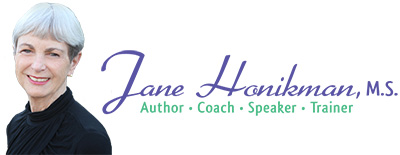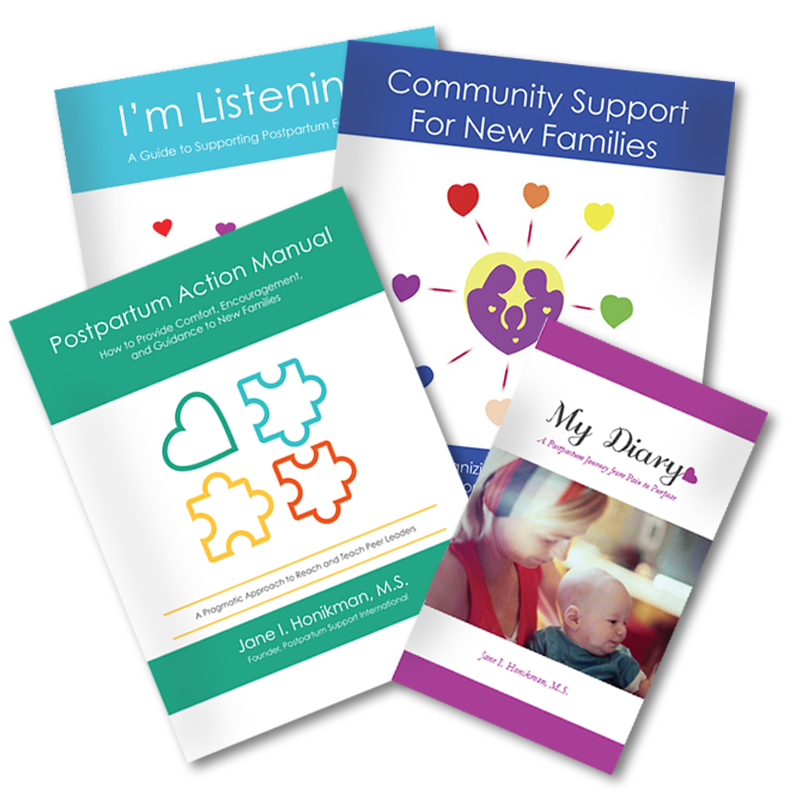Spirituality becomes important for many people at major life transitions, such as marriage, birth, and death. For some people, a sense of a higher power at work is with them all their lives. For others, this feeling may emerge over time. By “spirituality,” I don’t necessarily mean organized religion. It could simply be a desire to relate to a greater purpose or a search for life’s meaning. For many people in times of crisis, a need for prayer and contact with a higher being to cope with grief, fear, or a sense of desperation becomes very strong.
Through the many families I’ve worked with over the years, I’ve learned just how important spirituality can be for those suffering and recovering from childbearing -related depression. Some years ago, one mother said she’d been praying very hard to find peace and a respite from her struggle with what she was feeling. Another said the depression she experienced with her second child prompted her to talk to a priest for the first time in years. While he didn’t know how to help her, he did call a crisis center, which in turn referred him to the appropriate assistance for his parishioner. This is also a great example of how members of the faith community can be a link to help.
Hoping to make a connection to such a person in my own community, I spoke to the Clergy Association of Santa Barbara. Through that group, I found Reverend Everett Nielson, who agreed to speak at the 2001 Postpartum Support International conference, for which I wanted to include the topic of spirituality. It was at this conference that I heard his outstanding presentation, which I’d like to share with you. Reverend Nielsen was ordained in the Lutheran Church in 1960 and retired in 1998.
What is your congregation doing to help new mothers? Millions of women believe childbearing is one of life’s most significant events. Yet, for many, it’s also an excruciating and depressing experience. One woman told me, “I turn purple when some busybody from church comes up to me, cooing about motherhood. They either don’t know or can’t remember what it’s like to be a feeding machine and diaper dispenser. Not to mention what it’s like trying to go to the bathroom.” For some new moms, the gloom of postpartum depression hovers nearby.
In the past year, the media reported two vivid illustrations of tragedy connected to postpartum depression. Marie Osmond, the engaging entertainer, left her family. Andrea Yates, a Texas mother, admitted killing her five children, and sits in jail. They are only two of thousands who knew too little, too late about postpartum depression. Fortunately, Marie Osmond got help, has written a book (Behind the Smile: My Journey Out of Postpartum Depression [Warner Books, 2001]), and is now an internationally known spokesperson for dealing with this frightening and devastating condition. Andrea Yates, on the other hand, still faces the social consequences of her actions, whatever their cause.
The Gospel according to Luke tells the story about a young and unmarried Mary getting a message: “You’re going to bear a son.”
“How can this be?” she asked.
The Messenger told Mary, “Nothing will be impossible with God.” We can only imagine what the neighbors said. For Mary, and for many women since, single or married, young or old, raising a baby presents an incredible challenge. They deserve more than “ordinary” attention. As God’s instruments of compassion, what can congregations do to shine light in the darkness?
When asked to make a short list of places to turn to when she’s feeling blue about her new baby, the word “congregations” rarely shows up. How come? Do “the faithful” send unintentional messages of shame and judgment to moms who feel afraid, frustrated, irritable, or a host of other “normal” feelings? Sometimes. More often, benign neglect is the culprit.
Imagine with me two congregations. One is ordinary. The other adds something extra.
“Ordinary Church on the Corner” congratulates Emily, the expectant mom, sends her a “congratulations” card when the baby Hannah is born, and puts a rosebud on the altar the following Sunday. Someone brings her a casserole, and asks when they can all expect to see her and Hannah in church. Plans are made for baptism within the first month or two. That’s about it until someone asks the pastor, “Is Emily okay? I haven’t seen her in church.”
Like Ordinary Church, “Extraordinary Church by the Interstate” keeps in touch. Cards, rosebuds, and casseroles show up here, too, but with some significant additions.
Extraordinary Church encourages “planning ahead.” So, they offer pre-marriage education, using an excellent resource called PREPARE (see www.lifeinnovations.com and www.smartmarriages.com).
A “Mentor Couple,” trained and supervised by the pastor, leads the expectant couple in discussing the usual relationship issues like communication, conflict management, and family roles. They explain that “baby blues” are normal, though sometimes can lead to postpartum depression. They role -play what it might be like, and talk about the importance of experienced professionals.
Of course, not all babies are born to married couples, and not everyone attends pre -marriage classes. So, the congregation offers coaching classes, providing information about parenting dynamics, professional resources, and congregational support, to both single and married expectant parents.
Extraordinary Church has no medical or counseling personnel among its members, but they identify a single mother and two married grandmothers whose experience and sensitivity make them natural confidants for new mothers. They stay in close touch during the pregnancy. One of them, Martha, visits our fictitious couple, Peter and Brianna, at the hospital the day baby Jonathan is born.
The “Mommy-Care Threesome” sends along a list of things the church can provide, like a crib, stroller, or car seat. Martha tells them, “We’ve lined up meals for a week. Longer, if you need them. Let us know if there are some foods you don’t like.”
After Peter and Brianna bring Jonathan home, Martha brings them a tuna casserole, a bowl of salad greens, and a loaf of French bread. She admires the baby, and asks, “What’s it like for you to be a new mother?”
“I’m exhausted, but I feel like I’m taking part in something sacred,” Brianna answers. Before Martha leaves, they pray to thank God for a healthy baby.
One morning a few days later, a volunteer drops off some beef stew, and calls Martha to report Brianna seems quiet and withdrawn. “Normally, she’s so enthusiastic and talkative,” Martha replies. “I’ll check on her.”
Martha calls later that day to schedule a visit. Brianna answers the door in an old sweatshirt and shorts, hair tousled, and apologetic about the messy house. It’s clear Brianna feels down, and doesn’t want to talk much. Finally, she admits, “I felt crummy yesterday, so I clicked on the postpartum web site (www.postpartum.net). I took their survey, and I’m feeling almost everything on the list: angry and anxious, fat and trapped. I want to get back to work where I can talk to adults. Peter thinks we ought to see our doctor.”
Encouraged by Martha, Brianna has a thorough exam, which rules out a possible thyroid condition, among other things. The doctor prescribes medication for her anxiety and refers her and her husband to a couples’ counselor specializing in parenting.
As part of the follow-up, Martha tells them about groups such as La Leche League, for mothers who are nursing (www.lalecheleague.org), and Postpartum Education for Parents (www.sbpep.org) as well as about church resources (www.augsburgfortress.org). She shares a brochure about nursery care at church functions, and pre-school and child care referrals.
Brianna blossoms after several months, and emerges as a strong and healthy leader with new mothers in the church’s ministry. They schedule Jonathan’s baptism during a Sunday worship service so the grandparents can share the joy and support present in the “church family”.
Because Extraordinary Church prepared in advance, kept in close contact, and referred her to professional resources, Brianna received the help she needed and deserved. Prayers, meals, flowers, equipment, and sacramental rituals all contributed to a healthy result.
Ninety percent of new mothers do not move into postpartum depression. Brianna did. Only about 0.1% of all new mothers develop psychoses. Brianna didn’t. Most moms will be fine with basic preparation and care. Left without support, however, drastic things can happen.
New moms need not “turn purple” because of the “baby blues.” Living in deep darkness is not inevitable, and no one needs to face life alone. Congregations can make a huge difference by adding something “extra” to “ordinary” ministry.
Many thanks to Reverend Nielsen for letting me include his fantastic work in this book! Spirituality is an aspect so often missing from our thinking on primarily medical issues like PPD, and it’s helpful to be reminded how important it is—especially in such a creative way.


